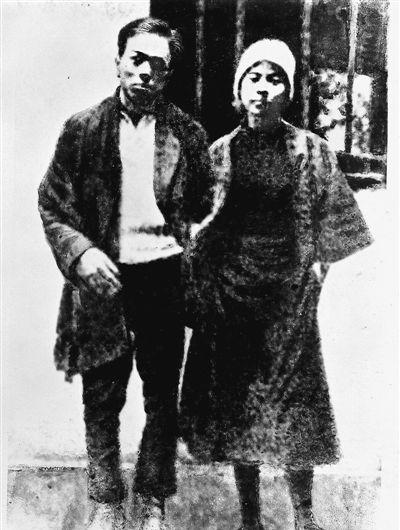Source: Party Building magazine
Sun Di Yan Xiaoyan

"Let this execution ground be the auditorium of our new marriage, and let the gunshots of the reactionaries be the salute of our new marriage!" In the movie "Wedding on the Execution Ground", the hero and heroine's marriage vows in the last moments of their lives have touched generations of Chinese audiences. The prototypes of the two martyrs with a strong will as steel in the film are the Communist Party members Zhou Wenyong and Chen Tiejun. On February 6, 1928, the two bravely fought at the Honghuagang Execution Ground in Guangzhou. At the time of his death, Zhou Wenyong was 23 years old and Chen Tiejun was 24 years old.
Zhou Wenyong, born in 1905 in Kaiping, Guangdong Province, to a poor family of teachers, joined the Communist Party of China in 1925. Chen Tiejun, formerly known as Chen Xiejun, was born in Foshan, Guangdong in 1904, and changed his name to Tiejun to show that he followed the Communist Party with his iron heart, and joined the Communist Party of China in April 1926.
In 1927, the Kuomintang reactionaries in Guangdong launched the "April 15" counter-revolutionary massacre, and Guangzhou was shrouded in white terror, and Zhou Wenyong, then director of the organization department of the Guangzhou Municipal Committee of the Communist Party of China and secretary of the Working Committee, was also included in the wanted list. After the 1987 Conference, Zhou Wenyong was appointed by the party organization to pretend to be husband and wife with Chen Tiejun, a member of the Women's Movement Committee of the Guangdong District CPC Committee, and established a sincere friendship to restore the leading organs of the Guangzhou Party and trade unions and prepare for the Guangzhou Uprising.
On December 11, 1927, under the leadership of Zhang Tailei, Ye Ting, and others, the Guangzhou Uprising broke out, the Guangzhou Soviet Government was established, and Zhou Wenyong was elected as the People's Labor Committee and Minister of Education of the Guangzhou Soviet Government. Due to the disparity in strength between the enemy and ourselves, the Guangzhou Uprising was ultimately defeated. In this context, Zhou Wenyong led some of the rebel forces, engaged with more than ten times the enemy's short troops, fought the enemy to the death to defend the newborn Soviet government, and only after the bullets were exhausted did he kill a bloody road, break through and evacuate Guangzhou, and come to Hong Kong to contact and resettle the comrades who had withdrawn to Hong Kong.
After the failure of the uprising in Guangzhou, the party organization was severely damaged and damaged, and it was almost paralyzed. In order to rebuild the party organs and organizations, Zhou Wenyong and Chen Tiejun returned to Guangzhou to persist in the underground struggle. Sometimes posing as wealthy businessmen and sometimes as coolies, they searched for lost party members and rebuilt secret contact points. Unfortunately, due to traitors, on January 27, 1928, Zhou Wenyong and Chen Tiejun were arrested at the same time.
In prison, the enemy tortured Zhou Wenyong and Chen Tiejun and inflicted them on them with pepper water, sitting on a tiger stool, and pointing fingers with bamboo sticks. However, in the face of all kinds of torture, the two have always been unyielding. In the end, the enemy, who had nothing to do and was ashamed and angry, decided to sentence the two to death.
On the execution ground, Zhou Wenyong and Chen Tiejun took firm steps and looked at ease. They developed love in the common revolutionary struggle, but for the sake of the revolutionary cause, they could only bury this feeling deep in their hearts. At the last moment of their dedication to the party's cause, they decided to make this sincere feeling public on the execution ground and make the execution ground the hall of their wedding. The day after the two of them died, a photograph of them standing next to each other under a barred window was published in the newspaper, and next to the photo read: "The two of us used to work together, we have never been married, and now we are announcing a wedding." ”
In order to commemorate Zhou Wenyong and Chen Tiejun, Jiangmen City built the Zhou Wenyong Chen Tiejun Martyrs Cemetery. In the cemetery, the monuments of the two martyrs stand tall, and on the left side are engraved Chen Tiejun's proverbs: "A revolutionary should learn from the noble qualities and heroism of great figures in ancient and modern China and abroad." Engraved on the right is the famous poem written by Zhou Wenyong before the uprising: "The head can be broken, the limbs can be broken, and the revolutionary spirit cannot be destroyed." The head of the strong man is the party fall, and the body of the good man is a group of cracks. ”
(Author Affilications: Central Academy of Party History and Literature) Party Building Magazine